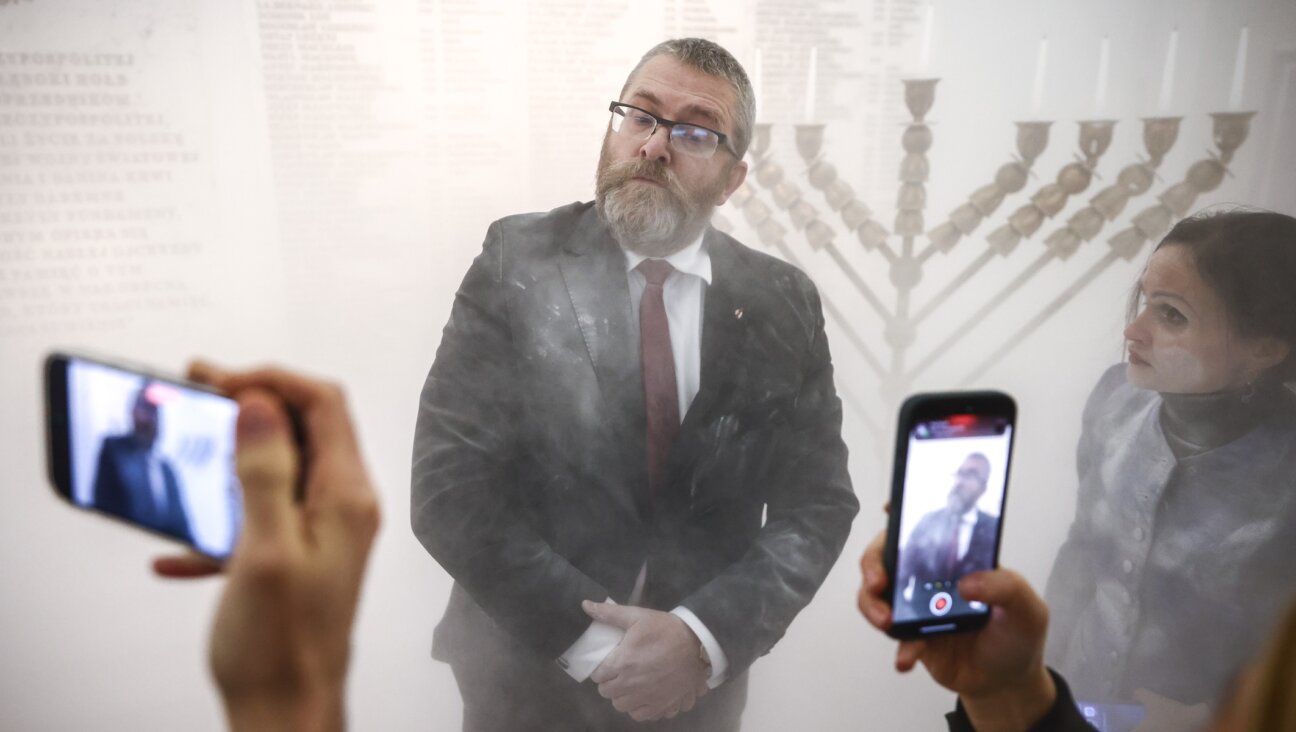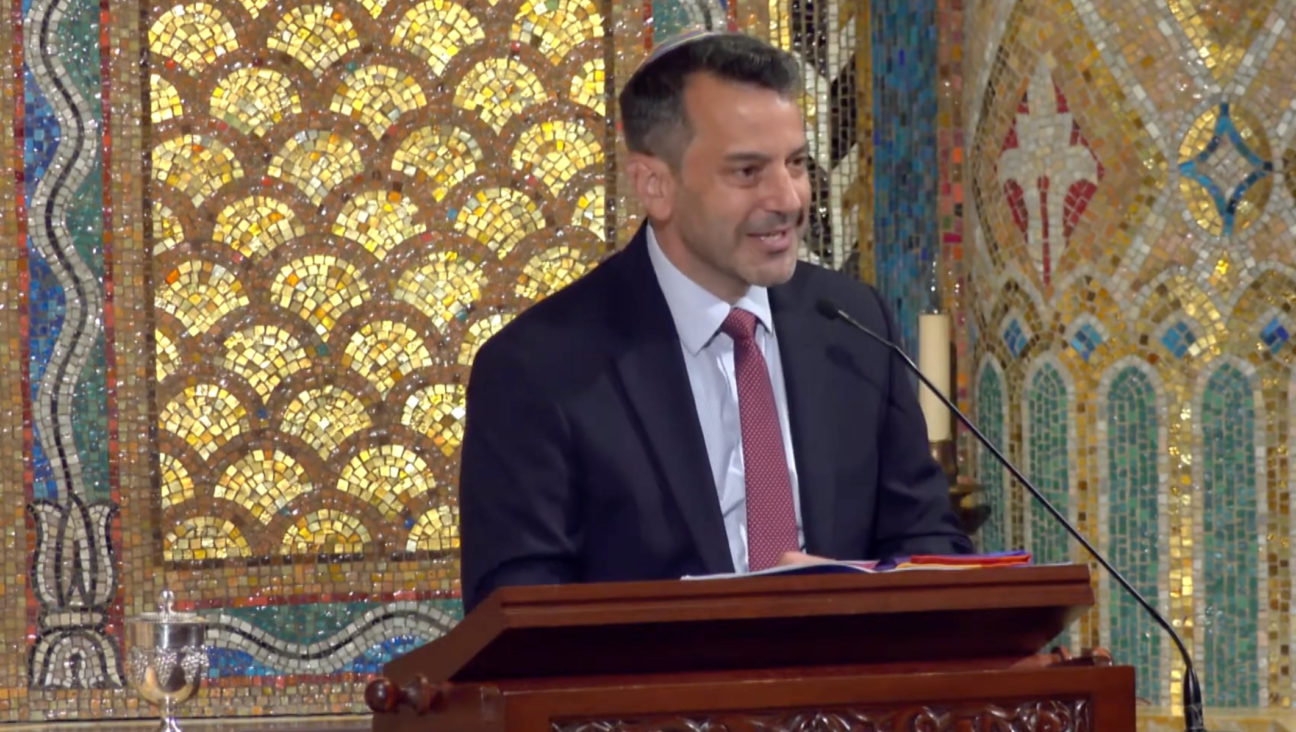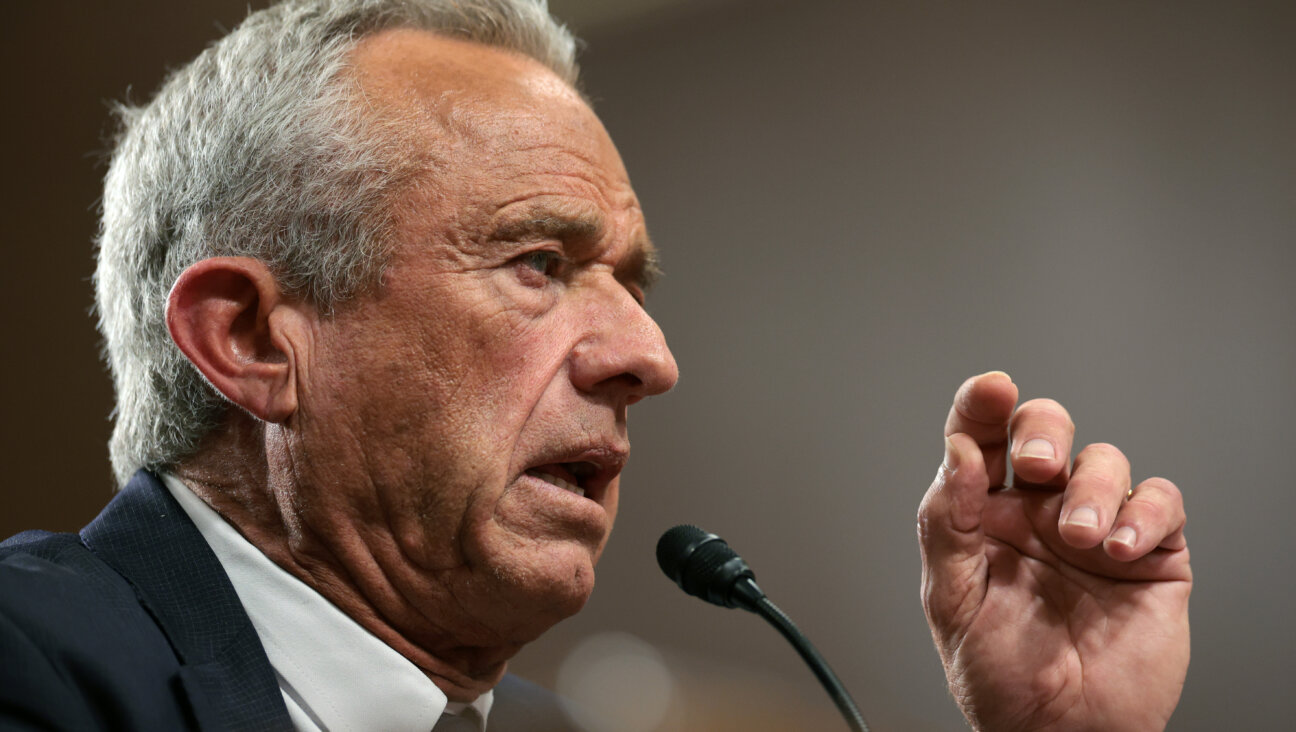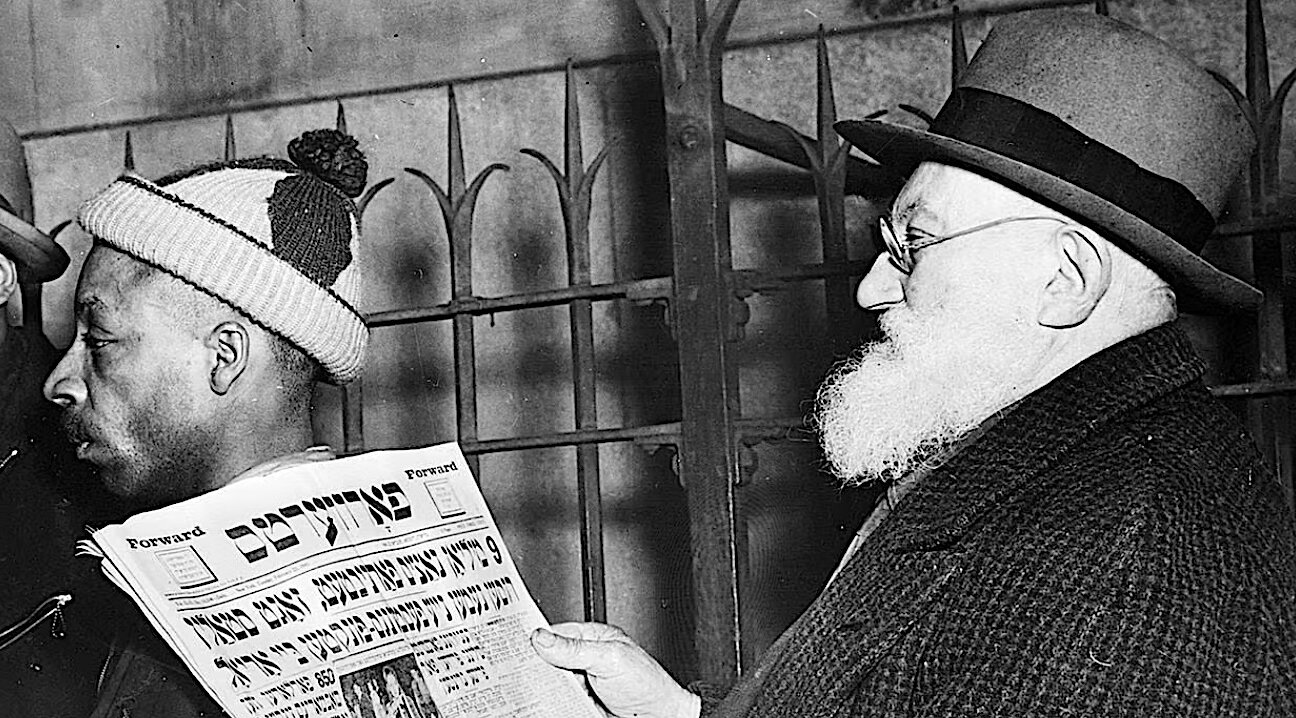Israel expels British Jewish activist who tried to immigrate under Law of Return
Leo Franks believes he was punished for his political activism and prevented from making aliyah by officials in Israel’s Interior Ministry

Israeli security forces try to disperse Palestinian, left-wing Israeli and foreign activists, during a protest near the West Bank Israeli settlement of Mitzpe Yair in Masafer Yatta near Hebron on June 10, 2022. (Ahmad Gharabli/AFP via Getty Images)
(JTA) — When Leo Franks landed in Israel in April, he could see the next stage of his life taking shape.
A British Jew, Franks, 25, had recently started his doctorate in history at a prestigious American university. He came to a country whose legal history he hoped to make the center of his research. Franks had been to Israel many times before and even had an Israeli girlfriend. On this trip, he hoped to make aliyah — to become an Israeli himself.
Entering the country on a tourist visa, Franks, a graduate student at the University of California, Berkeley, quickly began the paperwork to exercise his rights under Israel’s Law of Return, the guarantee of citizenship to Jews around the world that is at the heart of the country’s national identity. He then moved in with his girlfriend and prepared to start his new life.
Now, five months later, Israeli immigration authorities are showing him out.
Franks’ immigration troubles don’t stem from any doubts about his Jewishness, an obstacle that some aliyah applicants face. Rather, the problems began after Franks’ left-wing views took him to a West Bank flashpoint and an anti-government protest in Jerusalem, where he was briefly detained. Franks believes he was deliberately punished for his political activism and prevented from making aliyah by officials in Israel’s Interior Ministry, which handles immigration and citizenship.
“The story here is that the courts have given the Ministry of Interior free rein to make decisions about who can be a Jew in Israel on the basis of his politics,” he said in an interview with the Jewish Telegraphic Agency.
The degree to which Franks’ activism factored into his immigration troubles — his citizenship application was mysteriously closed and he currently faces an order to leave the country by Sunday — is not clear. The Interior Ministry did not respond to questions from JTA. While it raised concerns about his entanglements with law enforcement and about his motivation for being in the country in communications with Franks, the ministry did not directly say it was ordering him to leave because of his political activity.
Still, he and his attorney, as well as a number of others who have been tracking the Israeli government’s handling of left-wing activists, believe there is a strong connection.
“Was the ministry targeting him because he is some kind of activist? I can’t say. It’s clear the police want these activists to leave the country, and that was the end result of the ministry’s actions,” said Franks’ Israeli immigration attorney, Ira Rozina.
“This is a person with a right to make aliyah,” she said. “To prevent someone from exercising that basic right should require a very significant justification.”
It could seem reasonable for a country to want to deny citizenship to someone who has protested against it. But Israel’s Law of Return, which guarantees citizenship to all Jews and their children and grandchildren, outlines very narrow conditions under which a request can be denied. People with criminal records can be rejected, but they do not have to be.
While some Jews have been denied entry to Israel for their political views, such as supporting the boycott movement against Israel, no one is known to have been denied aliyah on such a basis.
“Even a criminal record isn’t enough,” Rozina said. “The person has got to represent a serious danger to take away their right.”
Rozina said she had never heard of a case like his, and while she declined to draw any sweeping conclusions about Israel’s commitment to taking in Jews under the Law of Return, she said the outcome was “surprising and alarming.”
Franks, who grew up in London and lived in Israel with his family for a time as a child, says he is not affiliated with any particular activist group. But he has joined an anti-settlement effort scorned by members of Israel’s right-wing government, especially those affiliated with the settler movement. They see the left-wing activists who protest in the West Bank, Jewish or not, as responsible for exacerbating tension between Israelis and Palestinians there and accuse them of attempting to undermine Israeli sovereignty.
Anger over the situation erupted in a heated Knesset meeting in March in which right-wing lawmakers accused left-wing activists of “severe violence” and anarchism.
“They [pro-Palestinian activists] are aggressive to IDF soldiers, to settlers, they damage property, they blacken Israel’s name around the world, engage in the demonization and delegitimization of Israel and damage our image,” far-right lawmaker Limor Son Har Melech of the Otzma Yehudit party said, according to the Times of Israel.
It’s widely believed that the government has heightened its efforts to tamp down on West Bank protests in recent months.
“The desire to throw out activists is well known,” said Omri Metzer, the executive director of Human Rights Defenders Fund, which provides legal aid to Israeli and intentional activists who support Palestinians in the West Bank.
“It’s not completely clear what measures are being taken to get them out, but it doesn’t matter because the reality is that the activists who defend human rights are operating under the threat of deportation,” he said.
Franks’ case carries new political significance, according to Metzer.
“We knew international activists face persecution but thought that activists who are Jewish are little more protected,” he said. “From Franks’ case, it turns out that might not be true anymore.”
Franks’ first brush with the law came the night of May 6 when he joined a protest led by the families of hostages taken by Hamas on Oct. 7 against Israel’s decision to invade the Gazan city of Rafah. As he was leaving the demonstration, he was arrested. Initially, he was accused of assaulting a police officer. The charge was quickly dropped because, according to Franks, a video recorded by police and shown to him at the police station revealed that he didn’t assault anyone but was rather the victim of police brutality.
Franks is not the first demonstrator to say he has been mistreated by police. Reports of aggressive and unlawful policing, especially at protests, have proliferated since Itamar Ben Gvir, a far-right politician, took over as minister of national security, overseeing law enforcement, in 2022. Ben Gvir has dismissed such accusations and defended law enforcement saying, “You are our heroes, and on my watch, you will have complete backing.”
The next incident took place a little over a month later, on June 19, in the South Hebron Hills of the West Bank. Franks says he was there as one of the Jewish volunteers who regularly arrive to escort Palestinian shepherds, hoping their presence can prevent attacks by Israeli settlers. Such attacks have been on the rise, according to Israeli advocacy groups and international observers, and have drawn sanctions from multiple world governments. Israeli soldiers at the scene asked to see Franks’ passport and after Franks refused, he was briefly detained, according to Franks’ account.
He was not charged with a crime, but the police confiscated his passport — a practice that Metzer said has become commonplace.
“It’s a recent method that’s emerged, that after they arrest you, they confiscate your passport and hold it hostage until you give up and book a ticket to leave,” Metzer said. “That way, there’s no formal deportation proceedings.”
On July 7, Franks, still without his passport, was briefly detained in the South Hebron Hills once again. This time, according to Franks’ account, his transgression was filming settler violence against Palestinians.
Getting detained is not unusual for activists in the South Hebron Hills and has been happening with increased frequency for years, according to Chase Carter, development and communications director for the Center for Jewish Nonviolence, which has long been active in the area. But he dates a change to the March Knesset meeting.
“Since the spring, we have seen an uptick in the targeting of international activists, including Jews, where basically arbitrary arrests are happening at a much higher rate,” Carter said.
The confiscation of Franks’ passport posed a major problem for him. He needed it for his scheduled appointment on July 10 with the Interior Ministry, a mandatory step in the immigration process. The police were refusing to release it and on the day of the appointment, Franks was in court asking a judge to compel the police to return the passport, which they did the next day.
Now, Franks needed a new immigration appointment and also an extension of his tourist visa, which was set to expire in a few days. He went in person to a ministry office on July 14 to make those requests but was told to return the next day with his lawyer.
When he returned, he was taken by an immigration officer for questioning. It was a brief exchange and the officer asked Franks about his detention, why he had gone to the South Hebron Hills, and what his future plans were, according to an official transcript of the conversation submitted to the court and shared with JTA. Franks said he was there because he “cares deeply about this country” and that he plans to make aliyah and live with his Israeli girlfriend.
Following his questioning, he was handed a document that upended his life.
It was a formal decision about his request but also more than that. The document characterized him as uncooperative in his questioning by the immigration official.
“The applicant chose not to respond to questions directly and spoke evasively while providing generic and vague answers,” said the document, which was submitted to court and shared with JTA. It also claimed that the purpose of his stay in Israel was unclear, though he was recorded as saying he was in the country to make aliyah.
The document also said that the ministry had looked into his run-ins with the law and found that “his passport had been confiscated by police because of crimes committed against the security forces” of Israel. Franks, despite allegations in the document, has not been convicted of any crime nor is he facing any criminal charges.
In another revelation, the ministry wrote that it checked with the Jewish Agency, which assisted him with his immigration request, and learned that the handling of his application had stopped.
“The applicant must leave the country within seven days of this letter or face action by law enforcement,” the document concluded.
Franks was stunned by the words he read.
“I froze and kind of teetered on my heels,” Franks said. “It just felt like the room was spinning and like I had been winded, like the breath had been vacuumed out of me. What really just smacked the breath out of me was the demand that I leave the country within a week. It felt like my entire world had crumbled.”
Deeply shaken, he still nevertheless believed the decision could be reversed.
“I was standing next to my lawyer, and I was looking at her, and I had this very real hope that the courts would safeguard me from this insane, car-crash of a judgment by the Ministry of the Interior,” he said.
His lawyer did two things. She filed a petition for emergency judicial intervention. And she asked the Jewish Agency to clarify why Franks was told his aliyah application was in limbo.
Within a few days, the Jewish Agency replied with a short email containing another stunning revelation about Franks’ situation. It was the Interior Ministry that ordered the Jewish Agency to freeze his application, the Jewish Agency said in the email, which was later submitted to court and reviewed by JTA. The Jewish Agency said it is against its policy comment on individual cases due to privacy concerns.
His lawyer accused the ministry of a “dirty trick.”
“He asked to renew his visa so that he could complete his application and they told him the case was closed as if they weren’t the ones to close it,” Rozina said. “The ministry did everything it could to prevent him from making aliyah.”
Franks said he sees his politics as compatible with the Israeli identity he hopes to achieve.
“I’ve met a number of Palestinians who have had their lives destroyed by the state that represents my people, by the state that, ostensibly, I’m supposed to be a part of,” he said. “And I’ve met a number of Jews who are Israeli, who are absolutely in pieces about what is happening and what has happened, at our hand.”
In the court proceedings that Franks initiated, which allowed him to remain past his visa’s expiration date, the Interior Ministry defended its actions. The ministry argued that it never received Franks’ aliyah application and that he therefore had no standing to challenge the decision ordering him to leave the country. In the ruling issued last week, the judge accepted the ministry’s argument, disregarding the mysterious freezing of his application.
She threw out Franks’ petition and ordered him to pay the ministry NIS 3,000 (about $800) in attorney fees. He can’t financially afford to appeal the decision to a higher court, Franks said. He has until Sunday to leave the country.
In response to an inquiry from JTA, the ministry released a short statement noting that Franks is welcome to start the aliyah process over from his home country.
His lawyers told him he would likely be denied a tourist visa if he tried to visit again and to expect obstacles if he applied for aliyah from abroad.
For now, he’s too disheartened to consider trying and is struggling to believe he wouldn’t be thwarted again. Through the ordeal, this scholar of Israeli law has become intimately familiar with his dissertation topic — little consolation as his two-year relationship ended under the strain of his pending deportation, and his dream of becoming an Israeli has been dashed, at least for now.
“I am just heartbroken,” he said. “The partner whom I had moved in with and intended to spend the rest of my life with, whom I had to break up with because of the denial of aliyah and order to leave, gave me back my tefillin, which I had left at her house, yesterday. Very bitter and tragic symbolism.”
A message from our Publisher & CEO Rachel Fishman Feddersen

I hope you appreciated this article. Before you go, I’d like to ask you to please support the Forward’s award-winning, nonprofit journalism so that we can be prepared for whatever news 2025 brings.
At a time when other newsrooms are closing or cutting back, the Forward has removed its paywall and invested additional resources to report on the ground from Israel and around the U.S. on the impact of the war, rising antisemitism and polarized discourse.
Readers like you make it all possible. Support our work by becoming a Forward Member and connect with our journalism and your community.
— Rachel Fishman Feddersen, Publisher and CEO






















